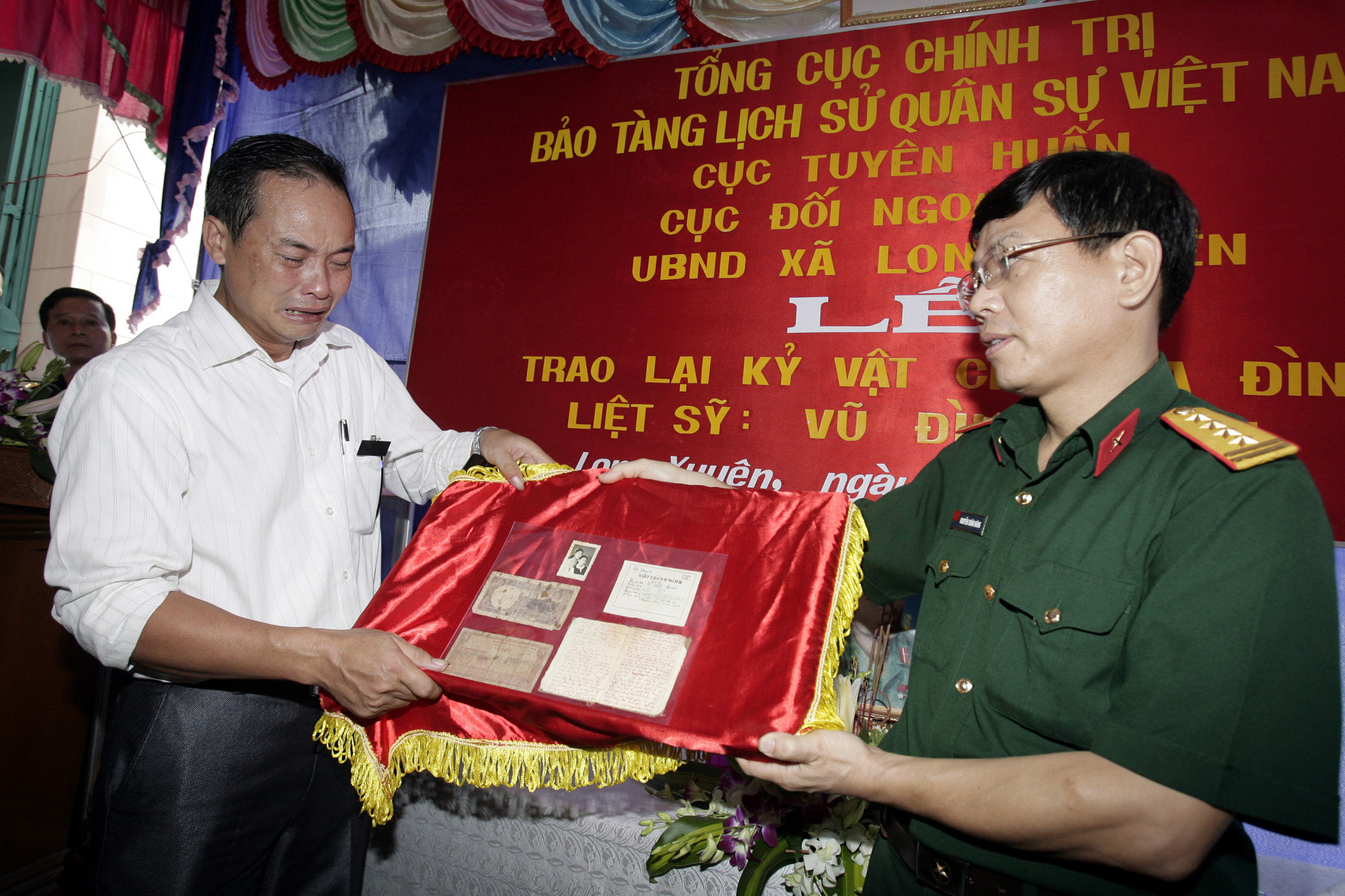 In this Friday, Sept. 21, 2012 photo, Vu Dinh Son, left, cries as he is given a diary and other mementos of his father by army officer Nguyen Xuan Nang in northern province of Hai Duong, Vietnam. Son was just two-year-old when his father was killed in fighting the American army in its doomed campaign in Vietnam. On Friday, Son was handed the wartime diary written by his father that had been returned by the United States, giving him a fresh glimpses of a man he never knew. The pocket-sized book was originally brought to Vietnam in June by Defense Secretary Leon Panetta, who was handed a bundle of letters written by an American soldier that had been kept in Vietnam in an exchange that symbolized closer ties between the two nations.
In this Friday, Sept. 21, 2012 photo, Vu Dinh Son, left, cries as he is given a diary and other mementos of his father by army officer Nguyen Xuan Nang in northern province of Hai Duong, Vietnam. Son was just two-year-old when his father was killed in fighting the American army in its doomed campaign in Vietnam. On Friday, Son was handed the wartime diary written by his father that had been returned by the United States, giving him a fresh glimpses of a man he never knew. The pocket-sized book was originally brought to Vietnam in June by Defense Secretary Leon Panetta, who was handed a bundle of letters written by an American soldier that had been kept in Vietnam in an exchange that symbolized closer ties between the two nations.LONG XUYEN, Vietnam - Vu Dinh Son was 18 months old when his father left home to fight American forces in Vietnam, and just 2 when the man was killed in a foxhole encounter with U.S. Marines. But the son now has fresh glimpses into the life of the father he never knew thanks to a wartime diary, returned to him courtesy of the United States.
The pocket-sized book was brought to Vietnam in June by Defense Secretary Leon Panetta, who, in return, was handed a bundle of letters written by an American soldier that had been kept in Vietnam. The high-level exchange of artifacts symbolized a joint desire for closer ties by the former enemies, who now share concerns over China's rise.
U.S. Marine Robert "Ira" Frazure took the diary from the chest of Son's father, Vu Dinh Doan, in March 1966 and then took it home with him, presumably as a war souvenir. Earlier this year, he asked the sister of a fellow Vietnam vet to track down Doan's family in Vietnam to return the diary. She did that with the help of the PBS television program "History Detectives," which tracked down Doan's family earlier this year.
"When my father left for the battlefield, I was too small to know anything, I was not even able to call out 'Dad,"' Son said Friday after a tearful ceremony outside his house during which the diary was returned, along with a photo of him and two bank notes.
"Whatever he wrote in his small diary will make us extremely happy," Son said. "We are tremendously proud of him, and in our heart he is a tremendous hero."
The red book is hard to decipher in places, but gives a flavor of the life of a North Vietnamese soldier at the beginning of the war: Entries talk of a 15-day march by Doan, hunger staved off with a meal of rice, salt and shrimp paste, and a vow to destroy "eight planes and five tanks."
The artifacts were placed during the ceremony next to a photo of Doan, whose body was recovered four years ago, in his uniform in front of burning incense. Above him was a photo of revolutionary leader Ho Chi Minh. Afterward, the family went to pray at his grave, which is in a cemetery reserved for war dead a short drive from the family house.
The United States and Vietnam normalized relations in 1995, 20 years after the end of a war that resulted in the deaths of an estimated 3 million Vietnamese and 54,000 U.S. soldiers. They have largely agreed to move on from the war, though tensions remain over effects of dioxide sprayed by the United States and Vietnam's human rights record. The U.S. relies on Vietnamese cooperation in its hunt for the remains of American soldiers in the country. The two countries have exchanged artifacts before, but never at such a high level. Rarely, if ever, has the Vietnamese army invited the media to cover the events.
The United States is seeking to boost its military and economic ties with Vietnam and other Southeast Asian nations, in a so-called "Asian Pivot" to contain China's influence in the region. Many of the countries, including Vietnam, share U.S. concerns regarding China and are looking toward Washington for diplomatic and military support.
Friday's ceremony, which took place a short drive east of Vietnam's capital, Hanoi, was attended by a representative of the U.S. military, but was organized by Vietnam. Its army is keen to show that it is trying to track down the possessions of dead soldiers, not to mention their bodies. There are still some 300,000 Vietnamese soldiers whose remains have yet to be found.
"This is a chance to remind the country of its tradition of fighting foreign aggressors and liberating the country," Col. Nguyen Xuan Nang said after the ceremony. "It reflects warming relations between the U.S. and Vietnam."
